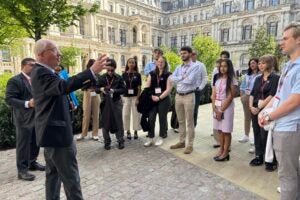AUSTIN, Texas—Four faculty members from Texas, California and Spain and nine graduate students from around the nation have been named to the first class of the prestigious Harrington Fellows program at The University of Texas at Austin.
The Donald D. Harrington Fellows Program was created by the late Sybil B. Harrington in 1987 in memory of her husband, Donald D. Harrington, who died in 1974. The $30 million endowment was funded by Mrs. Harrington and the Don and Sybil Harrington Foundation of Amarillo. The Donald D. Harrington Fellows Program will provide salary, research and support grants to the award winners.
"As we had hoped, the Harrington Fellows program has enabled us to attract some of the world’s best faculty and graduate students," said University of Texas at Austin President Larry R. Faulkner. "They bring with them tremendous talent, knowledge and experiences that will have a major impact on the university."
The four Harrington Faculty Fellows are Dr. Angela Belcher, an assistant professor in the Department of Chemistry and Biochemistry at The University of Texas at Austin; Dr. Xavier Cabre, mathematics professor at Universitat Politecnica de Catalunya in Barcelona, Spain; Dr. Beatrix Paal, assistant professor in the Department of Economics at Stanford University; and Dr. Jocelyn Olcott, assistant professor in the Department of History at California State University in Fullerton, Calif.
Olcott, who explores the history of women’s activism and political change in post-revolutionary Mexico, will be revising a book manuscript and co-editing a collection of essays in her field of study.
Belcher is doing pioneering research in combining organic and inorganic substances to generate new materials that can be used to produce transistors, wires, connectors, sensors and computer chips far smaller than anything manufactured so far. Belcher and her work were featured in the July 23 issue of Forbes magazine.
Cabre’s research focuses on mathematical analysis of problems arising in combustion phenomena in combustion engines. He also is interested in the propagation of signals along nerve fibers and in option pricing in markets, with emphasis on their financial risk.
Paal, a native of Hungary, is studying the interaction between episodes of high inflation and economic stabilization. Her projects focus on understanding how the differences across financial systems affect the way monetary policy operates.
The nine Harrington Graduate Fellowships are awarded to students working toward doctor’s and master’s degrees and students writing dissertations.
The two Harrington dissertation Fellows are Kathryn Ebel and Jamie Bacher, both of The University of Texas at Austin. Ebel who will be writing a dissertation for a Ph.D. in geography, specializes in the history of cartography in the Ottoman Empire. Bacher, who will be working on a dissertation in molecular biology, specializes in molecular evolution.
Six graduate students will be seeking doctoral degrees as Harrington doctor’s Fellows. They are:
- Jennifer Barrett from the University of Southern California, who will be studying toward a doctor’s degree in sociology and specializing in comparative sociology in Russia and Latin America, sexuality, gender and religion;
- Robert Scott Evans from the Georgia Institute of Technology, who is working on a doctor’s degree in mechanical engineering;
- Matilde Noemi Lalin of Princeton University, who will be working on a Ph.D. in mathematics, specializing in number theory with an algebraic inclination;
- Stephen Maldonado from the University of Iowa, who will be studying for a doctor’s degree in chemistry, focusing on electrochemistry and fuel cells;
- Kirill Novoselov from the University of North Dakota and the Moscow Institute for Electronic Machine Building, who will be studying management accounting in the Red McCombs School of Business;
- Aaron M. Shield of Wesleyan University, who has studied 12 languages and will be specializing in sociolinguistics.
There is one Harrington Master’s Fellow. She is Duke University graduate Sarah Cross, who will be researching social change through storytelling, performance, conflict talk, cultural thought and media.
The program is named for Donald D. Harrington, a successful independent oil and gas operator in the Texas Panhandle. The foundation he formed with his wife, Sybil, supported numerous causes, including the Panhandle-Plains Historical Museum and medical research.



